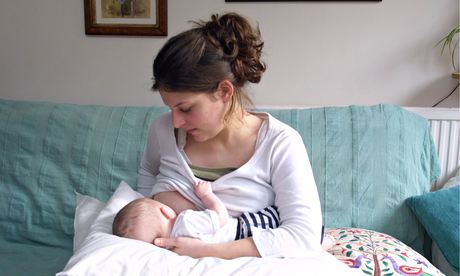
The idea that human breastmilk may not be good enough for human babies is clearly absurd. So what on earth should new mothers make of My Milk Count, a service marketed to new mums through parenting club Bounty, which offers to analyse a sample of breastmilk to check levels of DHA, which is important for brain development in babies. According to the MyMilkCount website (which was suspended on Monday morning for reasons unknown): "It is important to make sure that your breastmilk contains the correct balance of essential nutrients."
The fact is that lack or otherwise of DHA in breastmilk is simply not an issue. We don't test to make sure we have plenty of all other essential nutrients in our own, or our children's, diets so why test for DHA content? This excellent blogpost from the Analytical Armadillo blog also has some great detail on what these "optimal levels" might be – they turn out to be based on the Japanese level, which is the second highest in the world, after the Canadian arctic.
Dr Jack Newman, a Canadian doctor, and breastfeeding expert, says it is hypocritical of the MyMilkCount to suggest that breastmilk may not contain enough DHA and other omega fats: "Breastmilk always contains DHA and other omega fats. Up until 10 or 15 years ago no formula did. And yet the formula companies claimed their formulas were "close to breastmilk". But that means that before the introduction of long chained polyunsaturated fatty acids into formula, all formula-fed babies were not getting any."
"We know now of dozens, if not hundreds, of important ingredients that breastmilk contains and that formula does not. Breastmilk is the normal physiologic milk for babies and young children. We should not be asking whether there are enough nutrients in breastmilk. The company is trying to make money by scaring the mothers for no reason. I consider this unethical."
There are further reasons why it may be pointless to analyse a single sample of breastmilk. Breastmilk composition is known to vary depending on various factors (foremilk for example, is lower in fat than hindmilk) and a single test might not provide an accurate overall measurement.
Newman says: "Breastmilk varies, during a single feeding, from feeding to feeding, from day to day, from week to week and from month to month."
Unicef, which designed the Baby Friendly Initiative alongside the World Health Organisation in part to support breastfeeding, said: "Unicef UK is not aware of any reason why women should get their breastmilk tested for nutrients. It is worth noting that breastmilk changes in composition throughout the day, with different levels of nutrients at different times, so a single sample would not necessarily be indicative of the nutritional content. We are also concerned that promoting such a test could undermine women's confidence in breastfeeding during the early days and weeks, when in fact breastmilk is all the nutrition a baby needs for the first six months of life."
What is Bounty's position? Clare Goodrham, general manager of Bounty says: "Bounty supports the WHO/Unicef international code on the marketing of breastmilk substitutes and all subsequent resolutions both to the letter and the spirit … earlier this year, an email was sent to postnatal Bounty members on behalf of a vitamin company. The communication was aimed at mothers who have already chosen to breastfeed, and did not seek to change their intention. However, we recognised that it naively offered 100 breastfeeding mums the opportunity to check the levels of omega-3 DHA in their milk, with a view to promoting vitamin supplement products.
We recognise that this judgement was misguided and will ensure that its partners communications no longer make any reference to the My Milk Count service. Similarly we will update our best practice guidelines to make clear that we will never work with milk testing companies."
But campaigns and slips like this all add to the pressure felt by new parents. Breastfeeding can be incredibly hard, especially in the beginning, and being a new parent can be incredibly worrying. The combination of these two vulnerabilities is what makes products, and promotions like these so harmful as they take advantage of parents' insecurities – and it adds ammunition to voices already demanding parenting clubs such as Bounty be removed altogether from maternity wards.
Now is a time when our society is working to improve and promote breastfeeding conceptions in our culture. For most women nowadays, breastfeeding is – and should be – a choice: one that should not made more difficult by irresponsible marketing.

